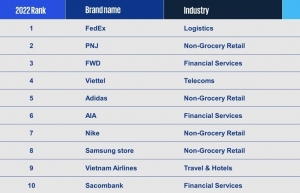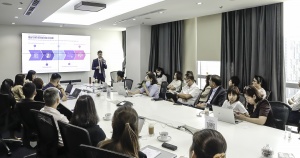Valuable guidance for operating in Vietnam
 |
| Warrick Cleine, chairman and CEO of KPMG in Vietnam and Cambodia |
What are the key drivers of the economic slowdown?
The world is still recovering from what we could call a global polycrisis, which means many different crises all hit us at once. We have the climate situation, and then the recovery from the pandemic, geopolitical conflict, and skyrocketing inflation, all of which have caused a lot of distress and in different economies around the world.
In the context of Vietnam and our business operations, we observe two major developments unfolding. Firstly, our export markets, predominantly the United States and Europe, are undergoing an economic deceleration due to inflation and amplified interest rates. This slump, in turn, impedes the demand for Vietnamese exports and has resulted in unfavourable consequences for the country’s economy.
Secondly, the domestic market is grappling with the bond market, the property market, and the stock market issues, all of which have contributed to a decline in consumer confidence. Collectively, these challenges have culminated in a sluggish pace of growth this year. Despite the prevailing uncertainties, we remain optimistic that the current downturn is transient, and we anticipate a recuperation by 2024, both domestically and internationally. Therefore, our message to fellow business persons is one of hope and encouragement.
What are multinational corporations’ greatest challenges in Vietnam in this current economic situation?
Informed decision-making is paramount. To achieve success in Vietnam’s investment landscape, the first thing is that multinationals must overcome various challenges, such as comprehending the legal and cultural frameworks and the market dynamics. Understanding the market is an essential first step towards investing in Vietnam.
The other thing is that businesses require certainty and confidence to make strategic investment decisions. When uncertainty arises, investments slow down, and decision-making becomes more cautious. This year, we are witnessing an unprecedented level of uncertainty in both global and Vietnamese markets, which is causing businesses to slow down their decision-making process, leading to a significant impact. This trend is evident in the reduced merger and acquisition activity worldwide, including Vietnam.
What actions should the government consider to ensure Vietnam’s relevance in the growth plans of such multinationals?
According to the latest statistics, Vietnam has maintained its top position in Southeast Asia for foreign direct investment attractiveness, and that still makes up a significant part of the country’s GDP. This is a remarkable feat that underscores the country’s allure to foreign investors, particularly in the manufacturing sector for exports, even in the midst of challenging environments.
As such, Vietnam should take pride in its success, and it is imperative that the government continues to encourage investment by honouring its commitments under trade agreements such as the EU and ASEAN, which helps in boosting investor confidence.
In addition, the local government must address domestic issues that hamper investor confidence, such as the corporate bond and property challenges. A timely resolution of these issues would instil greater confidence in investors and further enhance the investment climate in the country.
The government has just issued a legal framework to support bondholders and bond issuers. What is your take on the new initiative?
I believe that the most important thing that the Vietnamese government can do is to reinstate confidence in the market by ensuring that the legal framework for bond issuers and bondholders is well-defined. It is essential to educate investors about the potential risks associated with investing in any type of security, such as shares or property.
Restoring confidence in the bond market is also crucial, as it provides companies in Vietnam with access to much-needed capital. Therefore, anything that the government can do through clear lens legal frameworks and give confidence to the market will help companies go to the market and raise the capital they need to grow.
Overall, promoting transparency and clarity in the legal system is vital to foster economic growth and development.
What are the most significant foreign investment trends that you anticipate for Vietnam in 2023?
Vietnam continues to demonstrate its prowess as an attractive manufacturing base, with a surge in the number of international businesses relocating their sourcing and manufacturing activities to the country. This is particularly evident in traditional areas like footwear, commodities, and garments, and more recently, in electronic goods.
Moreover, investment in research and development (R&D) is also becoming a focal point in the country, with electronics and life sciences and pharmaceutical companies leading the charge. These efforts to bolster R&D capacity are critical for increasing intellectual property, which will subsequently enhance the value generated in the country’s supply chain.
Vietnamese businesses have previously struggled with a lack of innovation, and increasing investment in R&D is a promising trend that has the potential to change the landscape. If Vietnamese companies and foreign counterparts with operations in Vietnam can ramp up their efforts, there will be an increase in innovation, leading to more value creation in Vietnam.
This is the multiplier effect of manufacturing and research and development that we expect to see continuing in the coming years.
How may a global minimum tax (GMT) rate influence the flow of foreign investment into emerging markets such as Vietnam?
The GMT rate is a measure intended to promote fairness in the international market by ensuring that companies pay the appropriate taxes in the countries where they conduct their operations. In Vietnam, as in many developing nations, large corporations often pay taxes in other countries, despite doing business in Vietnam.
Therefore, ultimately, the rules represent a positive development for Vietnamese companies, as it ensures that everyone is taxed equitably for their business activities in the country.
However, like many other nations, Vietnam has previously relied on tax incentives to draw foreign investment. This competitive strategy may have been effective in the past, but it will become less critical in light of the new minimum tax rules. Consequently, Vietnam must shift its focus to other areas that can make it competitive and attractive to foreign investors.
To do so, Vietnam must improve various factors, including the quality of its workforce, productivity, and education, as well as the efficiency of its infrastructure, such as airports and electricity supply. The cost of importing and exporting goods, the availability of land, and the ease of doing business in Vietnam will also be significant considerations.
Improving these areas will allow Vietnam to remain competitive with its neighbours, including China, Thailand, Malaysia, and Indonesia.
How could KPMG in Vietnam facilitate and support foreign-invested enterprises in Vietnam?
Companies seeking to invest in Vietnam often require extensive information about the country to make informed decisions. This could include determining the best location for their facilities, understanding the costs associated with doing business in Vietnam, identifying the appropriate authorities responsible for approval processes, and obtaining the necessary licences to invest in the country.
KPMG recognises the challenges that foreign investors face and offers a comprehensive solution to address these issues. Our team of professionals works closely with companies to analyse the advantages and disadvantages of various investment alternatives and to help them make the right decisions. Our services include finding suitable locations, liaising with relevant authorities, navigating legal requirements, negotiating lease agreements, and assessing employment costs.
We offer a one-stop shop for investors, providing a wide range of services to help them establish their businesses in Vietnam with ease. Our team of experts includes accountants, lawyers, and consultants, who work together to provide an efficient and effective outcome for our clients. By offering all the services required under one roof, our clients do not need to engage multiple advisors, saving them time and money.
We understand that starting a business can be challenging, and we strive to provide our clients with a hassle-free experience. Our professionals are equipped to handle all aspects of the setup process, from legal and tax requirements to accounting and book-keeping needs. By providing a comprehensive solution, we aim to empower our clients to make smart decisions and establish their businesses with confidence.
What is KPMG’s focus for the rest of this year?
The recent years have been marked by significant global trends, particularly in technology, which are profoundly impacting businesses worldwide. KPMG recognises the importance of these trends, such as digital transformation and AI, and is working closely with clients to help them navigate these changes and how they impact their operations in Vietnam.
Alongside these technological trends, there is a growing emphasis on customer experience, which is critical for businesses to succeed in today’s market. KPMG is seeing a surge in demand from clients seeking to improve the customer experience, and our team of consultants is working tirelessly to help businesses develop digital strategies and streamline internal processes to enhance customer satisfaction across various sectors, including financial services and retail.
We leverage our expertise across a range of fields, including management consulting, legal, tax, and financial processes, to deliver tailored solutions to our clients.
These trends are expected to drive KPMG’s focus going forward, and we remain committed to providing our clients with the highest quality solutions to help them navigate the changing business landscape and remain competitive in Vietnam and beyond.
 | KPMG launches 2022 Vietnam Customer Experience Excellence Report A new KPMG report identifies the leading performing brands and industries providing exceptional experiences from the consumer's point of view. |
 | KPMG provides businesses with helpful solutions to manage cost and treasury On February 15 and 17, the workshop Cost and Treasury Management for Corporates took place at KPMG Vietnam’s regional offices in Hanoi and Ho Chi Minh City, attracting the presence of Luu Bao Lien, partner and head of Financial Management Consulting, Tim Kramer, director and head of the Special Situations Group, Hoang Thi Linh Chi, manager of Financial management Consulting, and Vu Quyen, director at FIS Global. |
What the stars mean:
★ Poor ★ ★ Promising ★★★ Good ★★★★ Very good ★★★★★ Exceptional
Related Contents
Latest News
More News
- KPMG launches tariff modeller in Vietnam to navigate US tariff risks (July 29, 2025 | 12:11)
- Removing hidden barriers to unlock ASEAN trade (June 29, 2025 | 11:31)
- New report charts path for Vietnam’s clinical trial growth (May 21, 2025 | 08:58)
- TTC Agris strengthens market position with investment in Bien Hoa Consumer JSC (May 19, 2025 | 10:14)
- World Bank to help SBV build shared database for banking industry (April 09, 2025 | 08:55)
- New trade alliances and investment hubs are redefining global power dynamics (April 03, 2025 | 17:00)
- ACCA and KPMG forge path for business leaders to pioneer ESG excellence (March 07, 2025 | 10:09)
- VietBank signs MoU with KPMG (February 26, 2025 | 18:47)
- Warrick Cleine MBE: an honour for services to British trade and investment in Vietnam (December 31, 2024 | 20:16)
- KPMG report offers fresh insight into leveraging AI (December 24, 2024 | 09:23)

 Tag:
Tag:




















 Mobile Version
Mobile Version